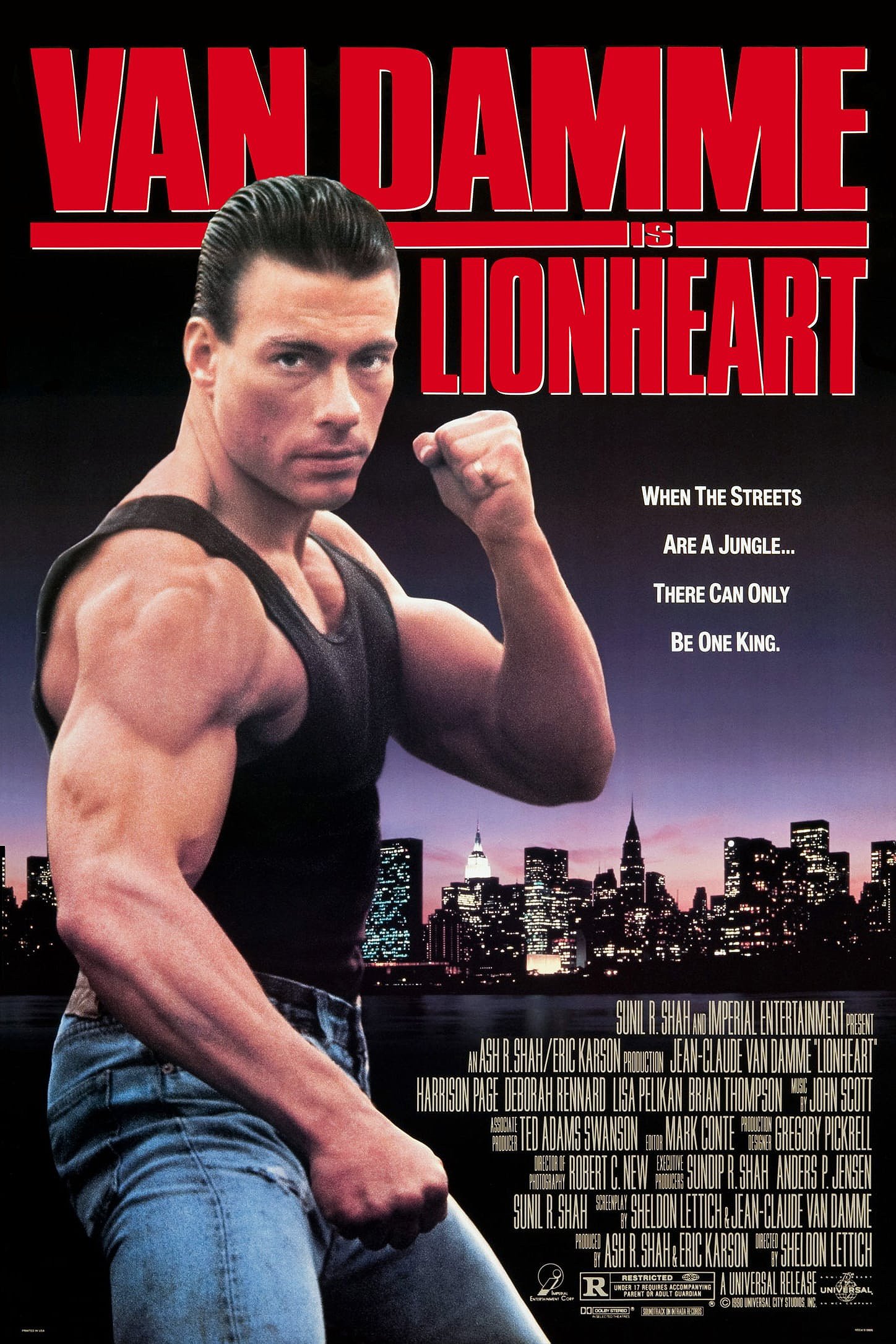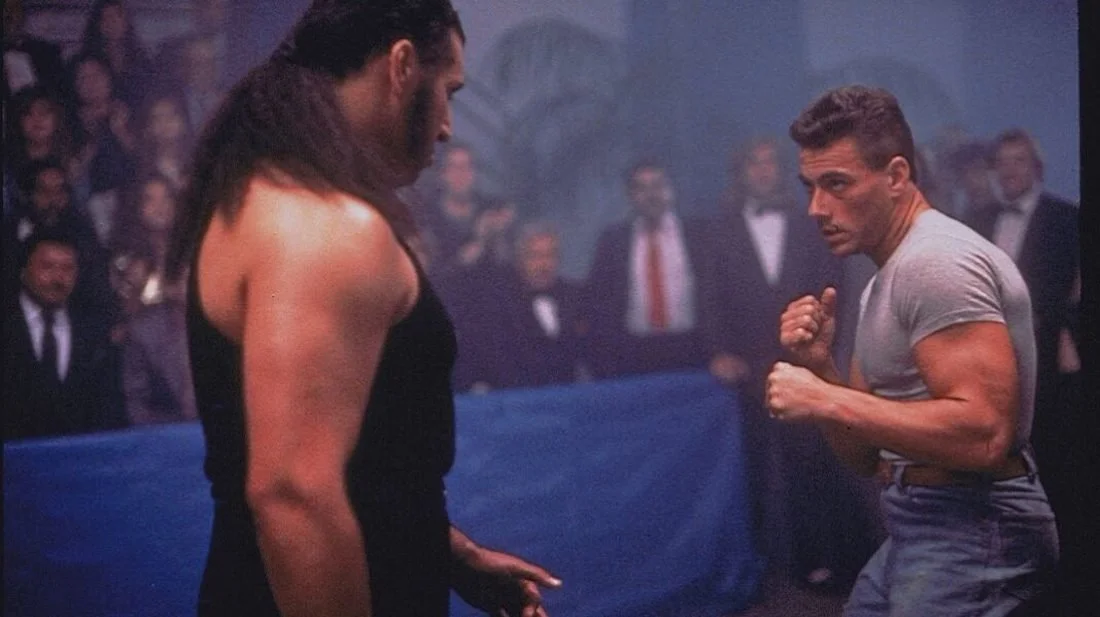LIONHEART (1990)
As eighteenth-century political philosopher Jean-Jacques Rousseau famously paraphrased from Motörhead, “When the people shall have nothing more to eat, they will eat the rich.” No, you didn’t click on the wrong link, we’re still celebrating June-Claude Van Damme and diving deep into the iconic filmography of "The Muscles from Brussels,” but upon rewatching LIONHEART (1990) for the purpose of this piece a handful of thought-provoking tidbits leapt out at me.
To put it succinctly for the precious few of you unfamiliar with this film, LIONHEART is about a French legionnaire, Lyon( Van Damme), who goes AWOL to see his mortally wounded brother and engages in underground street fights (as one does) to support his impoverished sister-in-law and niece. It’s a turn of the decennium kith and kin melodrama coated with a fisticuffs flavored candied shell. Pretty standard fare, right? Wrong! Shame on you for thinking things would shake out so simplistically! Bad reader! Bad!
Nah, I’m just foolin’. You’re doing great!
My affected admonishment is merely my clumsy attempt at a clever ruse to elucidate how the movie makes a conscious effort to subvert assumptions and expectations. What we get with LIONHEART through its cinematic self-awareness, an embracing of sentiment, and tacit treaties on class conflict is a unique and inspiring experience not often felt in genre films.
In regard to the notable quote referenced at the beginning, there's a particularly jarring scene early in the film in which, during a bloody underground boxing bout, a splash of the aforesaid sanguine fluid sprays the face of a decorous debutante. Instead of sickening the swanky spectator she seems strangely satisfied. She stares right at our hero Lyon, casually wipes the blood off her face, and licks it. First off, gross. There are such things as bloodborne pathogens, you know. And I haven’t looked into it but I’d imagine the instances of such infectious microorganisms are likely to increase in the world of illegal street fighting. Even more so given the strong contingent of destitute competitors displayed in the film. Secondly, it sends a clear message to Lyon (and thus us the viewers) that the social elites who organize and observe these beleaguered battlers see them as mere objects to consume and discard for their own barbaric pleasures. The physically manifested inversion of the aforementioned adage inspires Lyon and audience to fight (or should I say bite?) back against these malicious and moneyed muckety-mucks.
As JCVD tries to hit his wealthy antagonists where it hurts—in the pocketbook—co-writer/director Sheldon Lettich worked to differentiate LIONHEART further from other martial arts films by hitting us where it hurts even worse—in the feels. Lettich knew the formulas used in films like BLOODSPORT and KICKBOXER and wanted to show a different side of Van Damme to make a motion picture more appealing to demographics beyond just action movie aficionados. Through his relationship with his sister-in-law Helene (Lisa Pelikan), his niece Nicole (Ashley Johnson), and even his self-appointed manager Joshua (Harrison Page), we get a more heartfelt and paternal performance from Jean-Claude. Lyon isn’t just fighting for vengeance; he’s trying to support a family. Lettich insists that this patrimonial plotline adds to the overall drama of the piece and makes Lyon that much more appealing to female audiences in particular. Aside from the obligatory bare butt shot, ubiquitous in early JCVD films, Lettich even did a gender-swapped recreation of the shopping montage from PRETTY WOMAN (1990) to appeal to those less likely to plunk down hard-earned ducats for tickets to a standard street fight flick.
Speaking of ladies, “The Lady'' Cynthia Caldera (Deborah Rennard) acts as a fantastic foil for the French Foreign Legionnaire. A typical martial arts movie would likely have built towards Lyon facing off against the drug dealers that immolated his brother or somehow connect his final battle with Attila as being tangentially involved in that incendiary incident, but The Lady character works contrary to audience assumptions about a possible big bad. Lyon can’t defeat her with physical violence and retain his hero status so she makes for a fearsome final boss that has to be beaten using his wits, strategy, and insurmountable heart. There’s an intentionality behind this conflict that really furthers the preceded sociopolitical plotline and helps LIONHEART standout.
Aside from the economic exegesis and emotional entanglements, hindsight provides a lens into some additional fascinating facets to the LIONHEART mythos. For instance, I find it prophetic that the film is essentially a blueprint for a live action Street Fighter 2 and just a scant four years later we see JCVD star in the much-maligned STREET FIGHTER (1994) movie. It’s also worth noting that BLOODSPORT is very much the template that Mortal Kombat modeled for their setting, storyline, and Johnny Cage character only for Van Damme to pass on playing Cage in their own major motion picture adaptation in favor of taking center stage as Guile in STREET FIGHTER. Weirdly enough, it was recently reported that a downloadable skin featuring the likeness of Jean-Claude Van Damme will be available for the upcoming Mortal Kombat 1 so it looks like the prodigal pugilist performer finally debuts, thus putting JCVD in the rarefied air of starring in both of the biggest fighting game franchises of the ‘90s. And since we’re talking video games doesn’t Attila look shockingly like Andore from the side scrolling beat em up, Final Fight? Either somebody in production really had their finger on the pulse of the arcade gaming scene or creators over at Capcom are big fans of Van Damme and how could you not be after watching 108 minutes of Lyon just trying to be a stand-up dude while helicopter kicking all the ass.
While the general consensus seems to concur with the position asserted by acclaimed Austin, Texas punk band The Anchor in their hit tune “Lionheart Was Ok But Bloodsport Was Way Better,” the heaps of heart coupled with un petit peu of class war allows for this familiar fight flick to stand on its own two feet. Contrarians and naysayers will occasionally omit LIONHEART from the upper echelon of Van Damme films and while it’s perhaps not my absolute favorite, it is arguably the most well-rounded and accessible cinematic experience in the illustrious filmography of “The Muscles From Brussels” and you can bet on it.





